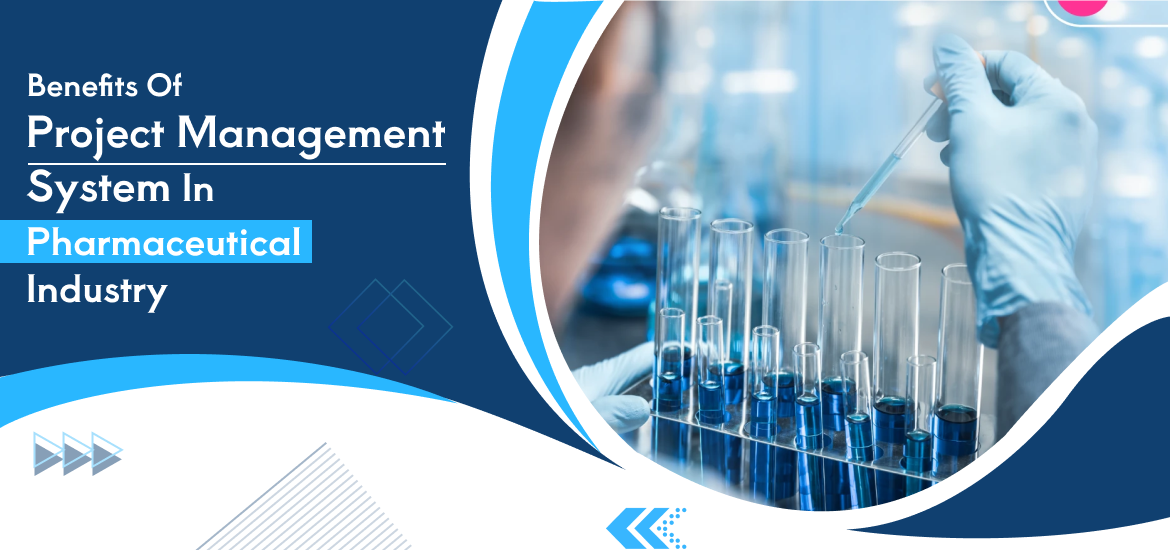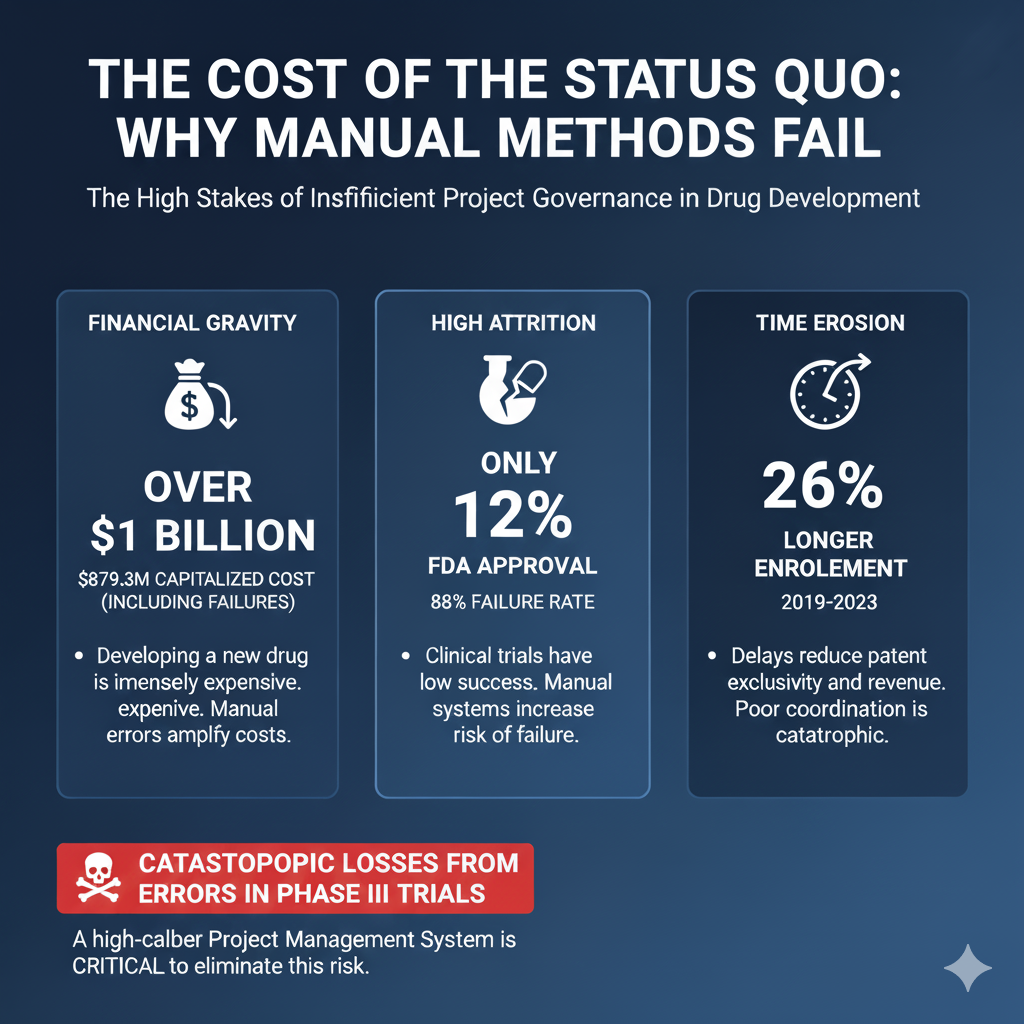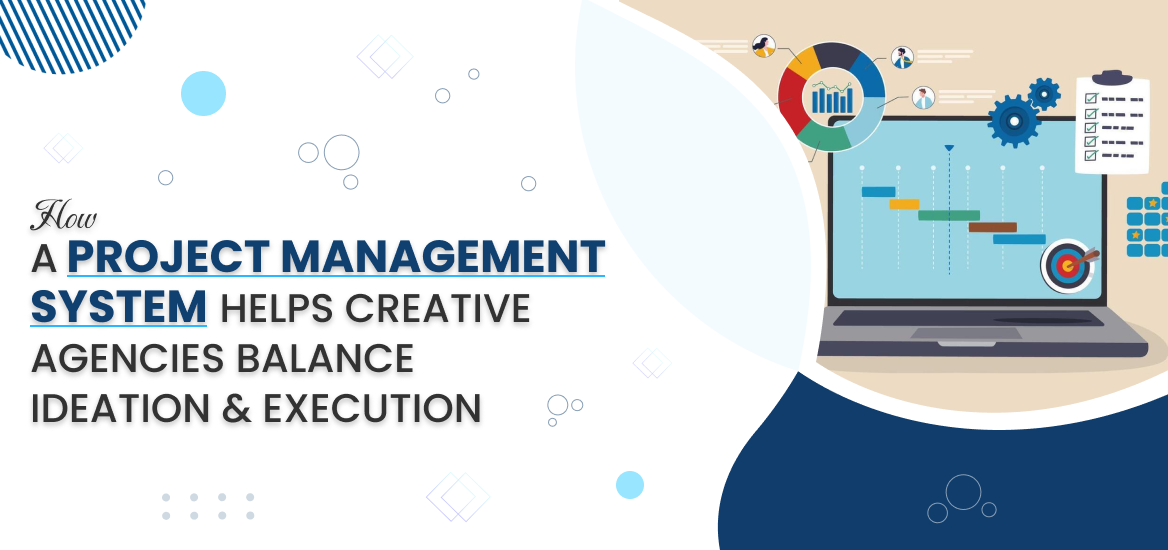
Project Management Software
Benefits of Project Management System in Pharmaceutical Industry
Oct 28th, 2025
In the pharmaceutical business, every business decision costs billions. Here delays mean lost months, or even years, of patient access to life-saving drugs. The pressure on pharma business owners, project managers, and executive decision-makers is huge. This stress comes from a development process that is complex, expensive, and high-risk.
The old ways of managing projects no longer work in the ever-evolving pharmaceutical industry. Using spreadsheets, email chains, and siloed departmental databases is not enough. Regulators, investors, and the global public demand better.
To succeed, companies must stop just “doing projects.” They must manage their entire drug pipeline as structured, connected projects. This shift needs a dedicated Project Management System (PMS). A PMS is more than a digital planner. It is a validated framework. It enforces necessary structure and transparency. This spans the whole organization, from the lab bench through to the commercial launch.
The real benefit of a Project Management System in pharma isn’t saving money on software. It’s about accelerating drug delivery to the market. It ensures unshakeable compliance. Most importantly, it protects multi-billion dollar investments.
The Cost of the Status Quo: Why Manual Methods Fail
Before discussing the benefits, we must acknowledge the huge industry challenges. Insufficient project governance makes these problems much worse.

- Financial Gravity: Developing a new drug is very expensive. Estimates range from $1 billion to over $2 billion, factoring in failed projects. According to a recent study, the estimated average capitalized cost is about $879.3 million. This includes the costs of failures and capital investments.
- High Attrition: Success rates are low. Out of all drugs that enter into clinical trials, only about 12% of drugs gain FDA approval. That means almost ninety percent of clinical drug development fails.
- Time Erosion: Timelines are stretching. The average time for clinical trial patient enrolment grew by 26% between 2019 and 2023. Poor site coordination, resource clashes, and broken communication cause these delays. They are catastrophic. Delays reduce patent exclusivity and hold up revenue generation.
A Phase III clinical trial costs hundreds of millions of dollars. If it fails due to documentation errors or a missed regulatory date, the losses are enormous. A high-caliber Project Management System is designed precisely to eliminate this critical risk.
Better Regulatory and Quality Assurance
Compliance is the most critical project goal in pharma. Speed comes second. When you fail to meet Good Manufacturing Practice (GMP), Good Clinical Practice (GCP), and Good Laboratory Practice (GLP), it will affect the product launch negatively. A Project Management System (PMS) helps you change compliance. It moves it from a reactive burden to a proactive, built-in workflow.
Automated Audit Trails and Traceability
Regulators like the FDA and EMA follow a strict rule: “If it isn’t documented, it didn’t happen.” This makes a PMS vital for project management in pharmaceutical industry.
- Integrated Documentation Control: The system puts all key documents in one place including trial protocols, batch records, SOPs, deviations, and CAPAs. It features version control and secure access. This removes the mess of local files and email attachments.
- Secure Audit Logs: Every action, change, and approval is logged automatically. It gets a timestamp and a user ID. During an inspection, a PMS lets an auditor instantly view the full history of any task or decision. This proves total data integrity.
- Structured Sign-offs: The system forces mandatory approvals at key stages. For example, a Quality Assurance sign-off must happen before a batch release. An IRB/Ethics Committee submission deadline cannot be missed.
The PMS gives Quality and Regulatory leaders instant readiness. The organization can move from development to a successful inspection. This avoids the frantic, last-minute search for data.
Accelerates the Development Pipeline
The market race requires exact schedules. It also needs optimal use of costly, specialized resources. A good Project Management System (PMS) is key here. It powerfully optimizes both resources and timelines.
Managing Cross-Functional Dependencies
Drug development involves complex hand-offs. Teams include research (preclinical), clinical (trial phases), manufacturing (CMC), and regulatory affairs. A delay in one phase can cascade. For instance, slow Phase II enrollment causes multi-month project overruns.
- Dynamic Dependency Mapping: The PMS uses tools like Gantt charts. It visualizes every task and its predecessor. Project managers instantly find the critical path. If a lab deadline is missed, the system auto-alerts downstream teams. Teams like Biostatistics and Regulatory Affairs adjust instantly.
- Workflow Automation: Repetitive tasks get automated. This includes document review for a trial site or formal CAPA closure. Automation ensures consistency. It drastically cuts administrative “lag time.” This lets valuable scientists and clinicians focus on science, not paperwork.
The Power of Task Management Software
Operationally, a PMS works like advanced Task Management Software. This applies in the lab or the clinical research office.
Picture a large, global Phase III trial. It involves many sites. The system breaks the trial into thousands of trackable tasks:
- Patient consent form updates.
- Site initiation visits.
- Data entry deadlines.
- Shipment tracking for clinical supplies.
This granular control is vital. Platforms like TaskOPad offer intuitive dashboards and automated reminders. This ensures every team member knows their exact duties and deadlines. It increases accountability. It keeps local work aligned with global strategy.
Also Read – How to Use a Task Management System to Achieve Your Personal and Professional Goals
Financial and Resource Optimization
Owners and CFOs view R&D spending as an investment. Complex projects often face cost overruns. Strong financial control is vital. A Project Management System (PMS) offers the visibility needed to protect the R&D budget.
Real-Time Resource Allocation and Capacity Planning
Scientific staff, key equipment (like bioreactors), and clinical sites are top company assets. They are also highly constrained. Overloading a key scientist wastes efficiency. Underutilizing expensive equipment hits the budget directly.
- Capacity View: A PMS shows a complete view of resource use across all projects. A project manager might see the lead toxicologist is 120% utilized. This prompts a strategic decision: delay a low-priority project or hire outside help.
- Budget Tracking: The system links project milestones to the budget. This allows real-time tracking of spending versus the plan. Financial forecasts rely on current project progress, not old reports. This gives executives the data for crucial go/no-go portfolio decisions.
Proactive Risk Mitigation
Every pharma project faces potential risks including unexpected side effects, vendor issues, supply chain breaks, or new regulations.
- Integrated Risk Register: A centralized Project Management System for the pharmaceutical industry keeps the risk register active and useful. Risks are formally logged. They get an owner. They link directly to mitigation tasks in the project schedule.
- Early Warning Systems: The Project Management System constantly monitors key data including milestones, resource limits, and budget spending. It generates automated alerts when KPIs slip too far. This shifts the organization from reacting to fires to managing proactively. It significantly lowers the chance of a major delay.
Strategic Alignment and Business Growth
The pharmaceutical pipeline is the business engine. A Project Management System (PMS) makes project management a strategic asset. It moves beyond mere operations.
Bridging the Gap from R&D to Commercialization

The hand-off is difficult. The clinical team focuses on scientific rigor. The commercial team focuses on market access and sales. Miscommunication is common here. Project Management Software offers one central source of truth. It unites these different groups.
- Unified Milestones: Commercial teams can track key deadlines. They see regulatory submission dates and PDUFA dates. This uses the same system as the regulatory team. This perfectly syncs marketing and manufacturing scale-up. It aligns with the expected approval timeline.
- Global Collaboration: For international launches, the PMS helps teams collaborate smoothly. This spans different time zones, cultures, and regions. Everyone works from the same core plan. Regional tasks—like packaging and legal reviews—hit their target date together.
A powerful PMS formalizes processes. It provides real-time visibility. This empowers your leadership team to:
- Make Data-Driven Portfolio Decisions: Leaders can easily check drug candidate performance. They compare progress to predicted timelines and costs. This allows for better capital prioritization.
- Increase Predictability: It lowers the variation in project completion dates. This leads to more reliable financial forecasts. It builds investor confidence.
- Accelerate Time-to-Market: Better efficiency shortens delays. This means earlier market penetration. It increases patent life utilization. This is the ultimate goal for any pharmaceutical owner.
Also Read – 8 Reasons Why Your Business Needs Project Management Software
Moving Forward with a Project Management System
For an organization dedicated to innovation and patient health, the shift to a structured Project Management System is inevitable. It is the necessary evolution for an industry defined by complexity.
The choice is whether to continue managing multi-billion dollar projects with legacy tools that hide risks and encourage manual error, or to adopt a validated, scalable solution that instills structure across the entire value chain.
Look for a Project Management Software solution like TaskOPad that is designed with user clarity and regulatory robustness in mind. The ideal system should offer flexible deployment, intuitive Task Management Software features, and the scalability to manage not just one clinical trial, but an entire portfolio of R&D, manufacturing, and commercial projects.
Embracing this transformation is not merely about achieving operational efficiency; it is about building a future-proof, compliant, and market-leading pharmaceutical enterprise. Book your free demo and see how TaskOPad can completely transform your workflow with a feature-rich project management system.
Search by posts
Search by posts
Recent posts
10-28-2025
Project Management Software
Benefits of Project Management System in Pharmaceutical Industry
10-27-2025
Task Management Software
Is Your Task Management Software Too Complicated? Signs You Need to Simplify Your System
10-17-2025
Project Management App
Why You Should Define Your Workflow Before Picking Project Management Software
9-30-2025
Project Management App











